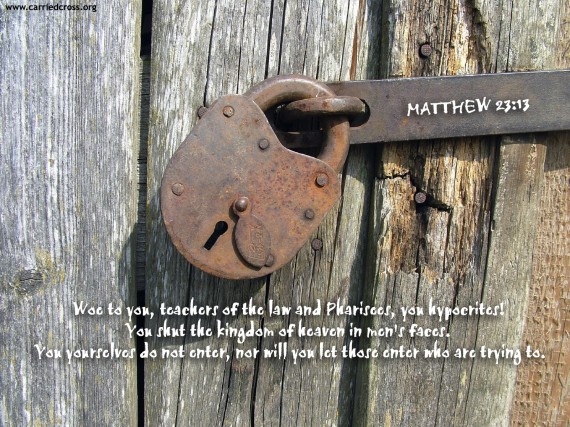 In Matthew 23 Jesus pronounces judgment upon the Pharisees for some of their beliefs and behaviors. He pronounces several “woes” upon the Pharisees for what they teach and how they live. As a result, many believe that we can follow the example of Jesus, and condemn those with whom we disagree, especially those who have bad theology or sinful actions.
In Matthew 23 Jesus pronounces judgment upon the Pharisees for some of their beliefs and behaviors. He pronounces several “woes” upon the Pharisees for what they teach and how they live. As a result, many believe that we can follow the example of Jesus, and condemn those with whom we disagree, especially those who have bad theology or sinful actions.
But I have been arguing that we must not judge and condemn others for their beliefs and behavior? If so, what can we say about the words of Jesus in Matthew 23? Do His actions provide justification to judge and condemn others, consigning them to hell, simply because we disagree with what they are saying or doing?
Well, there are numerous things going within the theological and cultural context of Matthew 23, most of which I cannot mention here. But here are some of the more important points to help us navigate Matthew 23.
Jesus was part of Rabbinic Judaism
First, remember that Jesus had some Pharisaic followers, and He Himself generally followed the Pharisaic tradition. So this criticism from Jesus was not a condemnation of an outside group, but was a criticism of part of the group to which He belonged. This is criticism from within. Jesus was criticizing His own group, in a similar fashion to how many Old Testament prophets challenged their own people, the people of Israel, to return to covenant obedience.
Hell refers to Bondage and Captivity
The references to hell (23:15, 33) are not referring to a place of judgment and torment after one dies. Instead, just as in Matthew 16:18, it refers to a life lived under bondage, condemnation, and captivity. The Pharisees were enslaving others to rules and regulations of religion, not bringing them into a free and liberating relationship with God which is characterized by mercy, compassion, and faith. In this passage, and throughout the Gospel of Matthew, the bondage and condemnation of hell is placed in direct contrast to the freedom and liberty of the kingdom of heaven. Both refers to two ways of living life on earth, and Jesus is saying that the ways of the Pharisees leads to a life of condemnation and burden, not to liberty and freedom.
The Kingdom is about Freedom and Mercy
Here we get to the true heart of the issue. The focus of Jesus and the central theme of the woes is the kingdom of heaven, what it looks like, and how the Jewish people should live as a result. But the Pharisees are making it too difficult for people to enter the kingdom, or live according to its ways (23:13). The kingdom is about justice, and mercy, and faith (23:23), not about following the minutest of laws and the tiniest principles which not only confuse the clear meaning of Scripture, but also do not provide aid to anyone in their life with God.

Jesus Loved Sinners
If we are going to follow the example of Jesus in criticizing and condemning others, there are a few principles to follow. First, don’t criticize sinners and people who do not “measure up” to our idea of righteousness. Jesus never did this. He loved the prostitutes. He forgave murderers. He invited greedy tax collectors to join Him. He shared food and drink with gluttons and drunkards.
Jesus Condemned Religious People
The only people Jesus ever criticized were those of His own religious group who were condemning and criticizing the prostitutes, murderers, tax collectors, gluttons, drunkards, and other “sinners.” Jesus criticized the religious leaders of His day who were making it hard for the “sinners” to experience the love, grace, and forgiveness of God. He wanted to make it easy for the kingdom of heaven to reign in people’s lives, not more difficult, and those who set up roadblocks received His harshest words.
So today, if we follow the example of Jesus, we cannot and must not condemn and criticize people of other religions, or people who are not Christians and who fail to live up to our standards of beliefs and behavior. Even within Christianity, we must not condemn or criticize those who do not believe like we do or behave the way we think is “right.” The only people who are worthy of criticism are those who make it difficult for others to participate fully with God, who keep others out, and push others away. We can justly criticize those who erect fences, boundaries, and walls to keep out the “sinners” and the “heretics.”
The kingdom of heaven advances with love, patience, kindness, forgiveness, grace, and mercy. When we set up restrictions, walls, fences, regulations, boundaries, and creeds which are designed to force some people out and keep the others in line, we are not advancing the kingdom of God, but rather, the condemnation of hell. UXZKGCWDXMAC




Spot on, my brother! Don’t hold back.
Be careful lest you be labelled a heretic like me.
Too late. Ha!
Self disciple for Christian growth can so easily turn into legalism.
Rick,
That is so true. It definitely can turn into legalism. Do you have suggestions for following Jesus without falling into legalism?
Did you mean to use the word “not” after the word must in the sentence “Even within Christianity, we must condemn or criticize those who do not believe like we do or behave the way we think is “right”?
I do not need anyone else to believe as I do, but many seem to think I should believe exactly as they do. I am suspicious that ignorance of the tens of thousands (perhaps more) of denominations and independent groups within Christianity, with the attendant variations of belief, contribute to the idea that any one person or group can possibly have a corner on “the truth”.
Jesus’ statement about loving God and neighbor seems to me to embody the truth. Inviting people into the Kingdom, rather than trying to keep them out because we suppose them to have the wrong beliefs on this or that, looks a lot like Jesus to me. Jesus’ religious contemporaries were absolutely certain Jesus had the wrong beliefs on about a jillion things.
Thanks for noticing that typo. I fixed it.
Sam, I am coming more and more to see that loving God and loving others is what the kingdom of God is all about, rather than strict adherence to a set of doctrines, which, although true, don’t do much to help us love God or others.
Love this post.
I agree with Josiah about the missing word ‘not’. I think the established Church in Great Britain would be squirming if Jesus came knocking at their door as many of them are pharisaical in their attitudes to what is The Truth. Unfortunately they have forgotten that Jesus said “I am The Way and The Truth and The Life, no one comes to The father accept through Me.
We as Christians need to grab hold of The Truth and show it to those who have not got it, by living it and witnessing, not only to other religious people but to other Christians who have lost their way, either through their own ides or an abusive Church that has bullied them into towing their line.
Not all deviants deliberately go astray and they can be taught the truth and change, some however want to justify their lifestyle by saying it’s OK to go on sinning as God knows I cant stop it, and as long as I love Jesus it’s acceptable. Paul says “do you really believe it’s right to go on sinning as it gives even more Glory to God” of course not. It’s not easy to stop sinning especially from addictions like Drink, Drugs, Promiscuity, Homosexuality, Stealing, Lying etc.
As soon as we say “we can’t do it” we can never change. It can take a lifetime to change but change we must. It’s down to choice and the most important ingredient is Gods Holy Spirit who can and will help us on the long journey home. Without His help we will fail as being determined to stop sinning will never be enough.
Lets leave the last words to Jesus “I have NOT come to condemn the world I have come to SAVE it”.
Clive,
Great Comment. And while I would never want to justify anyone’s sin, I find that the Holy Spirit is too busy dealing with me and my sin for me to have time to go and police the sin of other people also.
Sadly to many today even seem this person too,are clueless on truth .In fact the whole judge not saying is in fact one making judgement not to judge.Roman 2 speaks of Judge not this chapter comes right after Romans 1 which is full of Judgement.The scripture on Judge not only apply to judging other in a sin your yourself are in .As in hypocrite judgement. Now ! Jesus love people by telling them the truth.Jesus told them bluntly they were in sinner !!! That love .Then Jesus told them the solution to the sin nature .Paul judge Peter and many others in his letters. It is impossible to bring someone to salvation and repentence unless one judges they need a savior .Next the person knows they are a sinner. Hell is real place and those who reject the forgiveness Jesus offer will forever be in hell. Get a clue people …
I’m with you Dan. when I read this I thought, what weak theology this is. and some of the commenters amazed me as well. One mentioned no one has a corner on the truth. Yes someone does, and that is Jesus, and the word of God which is the Bible that we all have access to. I’ve struggled to find a church in my area that is not a wishy-washy seeker friendly church that will walk with you hand in hand to hell. I finally found one that’s a true Bible Church and it’s not afraid to preach sin, repentance, and hell.
Your sermons are so amazing. I had great joy reading it. Thank you. I pray that more people read your books and
know true faith.
This is good I am in tune w/Jesus on the wrong of religion! I grew up in a repressive Baptist BS w/law shoved down my throat. My mother who hated my father and would not forgive him for be a bad husband. In fact, she would use the bible to justify her hate, “God hated Esau”. So, we moved a lot, and she would change churches but always welcome to join, many churches. I could walk into any of those same church’s w/a beer, not drunk just enjoying a beer and they would tell me, “You can’t have that in here”. Religion is a bunch of BS! You speak of sin in the church and that is wrong. The only difference between the Church and the world is repentance. we all sin but a true member of the Church must repent.
In 1 Corinthians 5, Paul says he has already passed judgment on a man who belongs to the church and is living in sin with his mother-in-law. He also says the man should be thrown out of the church and hand(ed) over to Satan so that his sinful nature will be destroyed. If God, and God alone is the only one to judge Paul (or any human) from where does Paul believe he has the authority to condemn this man. Jesus loved sinners and had empathy for them. Can you help me understand this conflictive situation Paul presents? Thank you so much! John
in layman’s terms, Jesus was heart centered